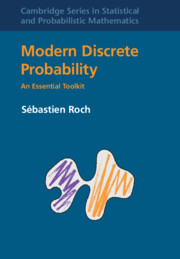6 - Branching Processes
Published online by Cambridge University Press: 14 December 2023
Summary
Branching processes, which are the focus of this chapter, arise naturally in the study of stochastic processes on trees and locally tree-like graphs. Similarly to martingales, finding a hidden branching process within a probabilistic model can lead to useful bounds and insights into asymptotic behavior. After a review of the extinction theory of branching processes and of a fruitful random-walk perspective, we give a couple examples of applications in discrete probability. In particular we analyze the height of a binary search tree, a standard data structure in computer science. We also give an introduction to phylogenetics, where a “multitype” variant of the Galton–Watson branching process plays an important role; we use the techniques derived in this chapter to establish a phase transition in the reconstruction of ancestral molecular sequences. We end this chapter with a detailed look into the phase transition of the Erdos–Renyi graph model. The random-walk perspective mentioned above allows one to analyze the “exploration” of a largest connected component, leading to information about the “evolution” of its size as edge density increases.
Keywords
Information
- Type
- Chapter
- Information
- Modern Discrete ProbabilityAn Essential Toolkit, pp. 327 - 396Publisher: Cambridge University PressPrint publication year: 2024
